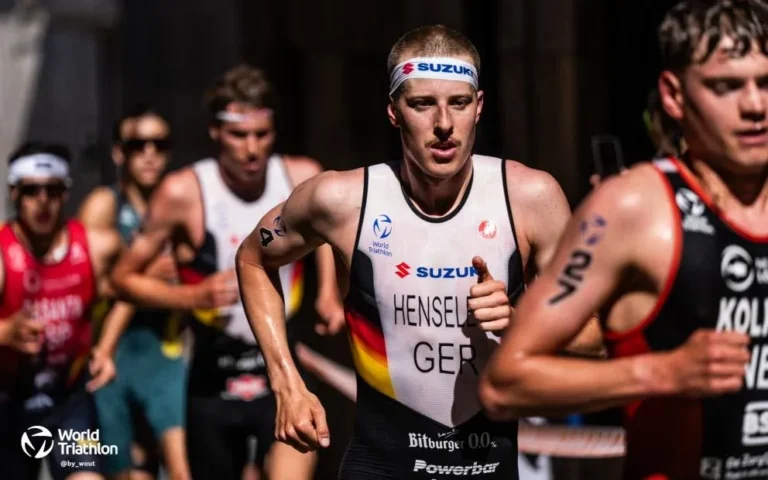As the saying goes, ‘preparation is the key to success.’ When it comes to gearing up for your next triathlon, the right strategies can make all the difference in your performance.
From fine-tuning your training plan to mastering your mental game and ensuring your gear is on point, every detail counts. But what specific steps can you take to elevate your preparation and maximize your potential on race day?
Let’s explore some essential tips and techniques that will set you up for a successful triathlon experience.
Key Takeaways
- Prioritize progressive overload and gradual distance increase for endurance and performance enhancement
- Maintain a carb-rich diet, protein intake, and proper hydration for sustained energy
- Dedicate time to mental preparation techniques for focus, confidence, and motivation
- Prepare gear and equipment meticulously, visualize the race, and practice transitions for race day success
Training Plan Development
When crafting your training plan for an upcoming sprint triathlon, prioritize progressive overload to steadily enhance your endurance and performance levels. Your training plan should span 12 weeks, incorporating two sessions each of swimming, biking, and running per week. To avoid burnout and overtraining, it’s crucial to gradually increase your distances by 10% weekly. This incremental approach will help build your endurance efficiently while minimizing the risk of injuries.
In addition to the swim, bike, run sessions, don’t overlook the importance of incorporating resistance training into your plan. Targeting specific muscle groups won’t only improve your overall strength but also boost your power for all three disciplines. Remember to include rest days in your schedule to allow your body to recover and adapt to the training stimulus effectively.
Consider seeking coaching to fine-tune your technique and receive guidance on structuring your training plan for optimal performance. A coach can provide valuable insights and help tailor your plan to suit your individual needs, ensuring that you’re well-prepared for the demands of the triathlon.
Nutrition and Hydration Tips
To optimize your performance in the upcoming triathlon, focusing on proper nutrition and hydration is paramount. Ensuring your body is fueled and hydrated adequately can make a significant difference in your endurance and overall performance during the race. Here are some essential tips to keep in mind:
- Nutrition: Maintain a diet rich in carbohydrates such as pasta, grains, fruits, and vegetables to provide your body with the necessary energy for the triathlon.
- Protein: Integrate sources of protein like legumes, egg whites, and low-fat dairy products to aid in muscle recovery and repair post-training sessions.
- Hydration Practices: Stay well-hydrated by consuming 6 to 10 eight-ounce glasses of water daily to prevent dehydration both during your training sessions and on the day of the race.
- Consistency: Consistently following proper nutrition and hydration practices is key to sustaining energy levels, enhancing endurance, and optimizing your overall performance throughout the triathlon.
Mental Preparation Techniques
Engage in mental preparation techniques to enhance your focus and confidence for the upcoming triathlon. Dedicate 10-15 minutes daily to visualization, vividly imagining every detail of your race from start to finish. This practice can boost your mental toughness and resilience, giving you a competitive edge.
Positive self-talk is another powerful tool; use affirmations to reinforce a strong mindset during training and on race day. When pre-race nerves and anxiety strike, employ relaxation techniques like deep breathing or meditation to stay calm and focused.
Consider creating a race-day mantra or visualization cue to keep you motivated through tough race segments. If you find yourself struggling with mental preparation, seeking guidance from a sports psychologist or mental performance coach can provide you with personalized strategies to overcome any mental barriers.
Gear and Equipment Checklist
Review and ensure that your gear and equipment checklist is complete and ready for your upcoming triathlon to optimize your performance on race day. Here are some key items to include in your preparation:
- Fresh Bike Tires and Tubes: Make sure your bike is equipped with new tires and tubes, and don’t forget to pack the necessary tools for fixing a flat tire during the race.
- Running Shoe Laces: Check and replace your running shoe laces if needed to ensure optimal performance during the run segment of the triathlon.
- Extra Swim Cap and Goggles: Pack an additional swim cap and goggles to be ready for any potential equipment issues during the swim leg of the race.
- Comfortable Transition Gear: Bring comfortable post-race clothing and shoes to smoothly transition from the race to the post-event activities.
Race Day Strategy
Visualize your race day strategy by mentally rehearsing each segment of the triathlon in vivid detail, preparing yourself for a successful and focused performance. Visualizing the race helps you anticipate the transitions between swimming, biking, and running, allowing for smoother and quicker changes.
Familiarize yourself with the race course to identify any challenging sections or important landmarks, giving you a competitive edge.
Create a checklist for race day essentials such as nutrition, hydration, gear, and clothing. Ensure you have everything you need well in advance to avoid any last-minute stress.
Stay calm and focused on race day to execute your strategy efficiently and effectively. Practice your transitions repeatedly to make them seamless and efficient, shaving off valuable seconds during the race.
Conclusion
So, as you gear up for your next triathlon, remember to focus on developing a solid training plan, fueling your body with the right nutrition and hydration, preparing mentally for the challenge ahead, double-checking your gear and equipment, and executing a well-thought-out race day strategy.
By incorporating these preparation strategies into your routine, you’ll be setting yourself up for success on race day and maximizing your performance potential. Good luck and enjoy the journey!
